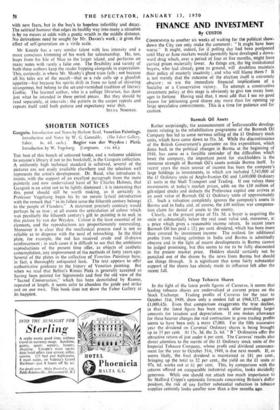FINANCE AND INVESTMENT
By CUSTOS CONDEMNED to another six weeks of waiting for the political show- down the City can only make the comment: "It might have been worse." It might, indeed, for if polling day had been postponed until May or June markets would inevitably have developed a down- ward drag which, over a period of four or five months, might have carried prices materially lower. As things are, the big institutional buyers, who had already gone to ground, will doubtless maintain their policy of masterly inactivity ; and who will blame them ? It is not merely that the outcome of the election itself is extremely obscure ; so are the immediate financial implications of a Socialist or a Conservative victory. To attempt a constructive investment.policy at this stage is obviously to give too many host- ages to fortune. Having said that, I must add that I see no good reason for jettisoning good shares any more than for opening up large speculative commitments. This is a time for patience and for caution. CONDEMNED to another six weeks of waiting for the political show- down the City can only make the comment: "It might have been worse." It might, indeed, for if polling day had been postponed until May or June markets would inevitably have developed a down- ward drag which, over a period of four or five months, might have carried prices materially lower. As things are, the big institutional buyers, who had already gone to ground, will doubtless maintain their policy of masterly inactivity ; and who will blame them ? It is not merely that the outcome of the election itself is extremely obscure ; so are the immediate financial implications of a Socialist or a Conservative victory. To attempt a constructive investment.policy at this stage is obviously to give too many host- ages to fortune. Having said that, I must add that I see no good reason for jettisoning good shares any more than for opening up large speculative commitments. This is a time for patience and for caution.
Burmah Oil Assets
Rather surprisingly, the announcement of 'Unfavourable develop- ments relating to the rehabilitation programme of the Burmah Oil Company has led to some nervous selling of the £1 Ordinary stock units, which have come down to 51s. 3d. While the discontinuance of the British Government's guarantee on this expenditure, which dates back to the political changes in Burma at the beginning of 1948, has come as a forcible reminder of the difficulties which beset the company, the important point for stockholders is the immense strength of Burmah Oil's assets outside Burma itself. In recent years the main source of income has been the company's large holdings in investments, in which are included 5,343,000 of the £1 Ordinary units of Anglo-Iranian Oil and 1,600,000 Ordinary £1 units in the Shell Transport and Trading. If one values these investments at today's market prices, adds on the £10 million of gilt-edged stocks and deducts the Preference capital one arrives at an asset value of Burmah Oil £1 Ordinary units of approximately £3. Such a valuation completely ignores the company's assets in Burma and in India and, of course, the £40 million war compensa- tion claim for denial of assets to the enemy.
Clearly, at the present price of 51s. 3d. a buyer is acquiring the units at substantially below the real asset value and, moreover, at a price which gives a reasonable income return. In recent years Burmah Oil has paid a 121 per cent, dividend, which has been more than covered by investment income. The outlook for additional profits from trading activities in India and Burma is admittedly obscure and in the light of recent developments in Burma cannot be judged promising, but this seems to me to be fully discounted in the present market price. Holders should' certainly not be panicked out of the shares by the news from Burma but should see things through. It is significant that some fairly substantial support of the shares has already made its influence felt after the recent fall.
Cheap Tobacco Shares
In the light of the latest profit figures of Carreras, it seems that leading tobacco shares are undervalued at current prices on the Stock Exchange. Trading profits of Carreras for the year to October 31st, 1949, show only a modest fall at £968,327, against £1,009,426. Even that comparison exaggerates the true decline, in that the latest figure has been struck after providing larger amounts for taxation and depreciation. If one makes allowance for these heavier charges the real contraction in gross trading profits seems to have been only a mere £7,000. For the fifth successive year the dividend on Carreras' Ordinary shares is being brought up to 35 per cent. At 15s. 3d. the 2s. 6d. " B " Ordinaries offer the attractive return of just under 6 per cent. The Carreras' results also direct attention to the merits of the £1 Ordinary stock units of the Imperial Tobacco Company, whose profit and dividend announce- ment for the year to October 31st, 1949, is due next month. If, as seems likely, the final dividend is maintained at 1.8+ per cent., bringing up the total to 32 per cent., the yield on the LI units at 97s. 6d. works out at 64- per cent. This, by comparison with the returns offered on comparable industrial equities, looks decidedly generous. While one should not attach too much importance to Sir Stafford Cripps's optimistic forecasts concerning Britain's dollar position, the risk of any further substantial reduction in tobacco supplies certainly looks smaller now than a--few months sago.






























 Previous page
Previous page